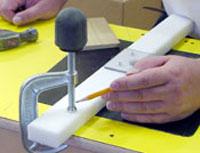Isolate the Bearing
This router tip covers a setup that we call "Isolate the Bearing". This tip is for all levels of woodworking skill and is a fundamental setup technique used to mould the edge of a straight piece. Isolating the bearing uses a combination of the table fence and a piloted router bit. Prior to setting up the fence, we have installed a 1/4" round over bit in a table mounted router and set the height of the bit profile to 1/16". Note: Before trying these procedures make sure that your router is unplugged and the router bit is tightly fasten into the collet. The secret to being safe, accurate and fast is to first understand the setup techniques then to practice, practice and practice again. The above tip is one of the most used router setups and once it is mastered it will serve you well when making quality woodworking projects.
Step One: Position the fence
Position the table fence and clamp the out-feed side. See photo.

Step Two: Setting up the in-feed
Move the in-feed side of the fence into position. Using a straight piece of material position the bearing flush with the out-feed and in-feed of the table fence. See photo.

Step Three: Clamp the in-feed
Hold the fence in this position and clamp the in-feed side. See photo.

Step Four: Check the set up
Once the fence has been clamped into position, use your wood sample and check to make sure that the pilot bearing on the bit has been isolated. In other words the bearing has to be even with the out-feed and the in-feed of the table fence.
If the bearing is ahead or behind the in-feed and out-feed surface of the fence use a hammer to reposition the fence. See photo.

Test Your Skills:
To practice the above procedures cut five 4" X 6" X 3/4" blocks. Isolate the bearing and rout all four sides on one of your samples. Unplug the router. Now take down the fence and repeat the above procedure for each of your practice pieces. Remember, safety and accuracy are the first lessons to learn. With practice, skill will be acquired and once skill is achieved then speed will be increased. Never forget safety.
